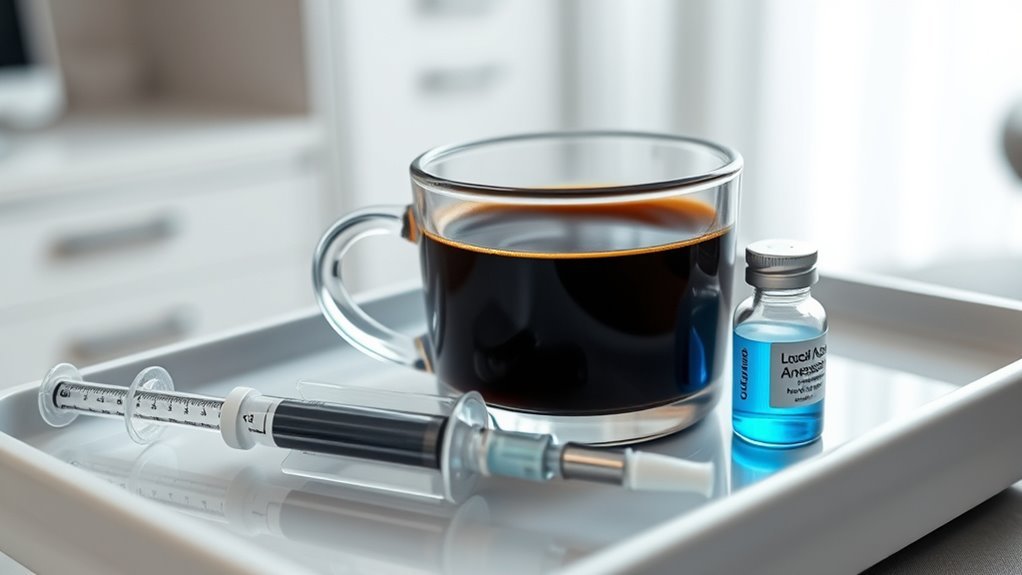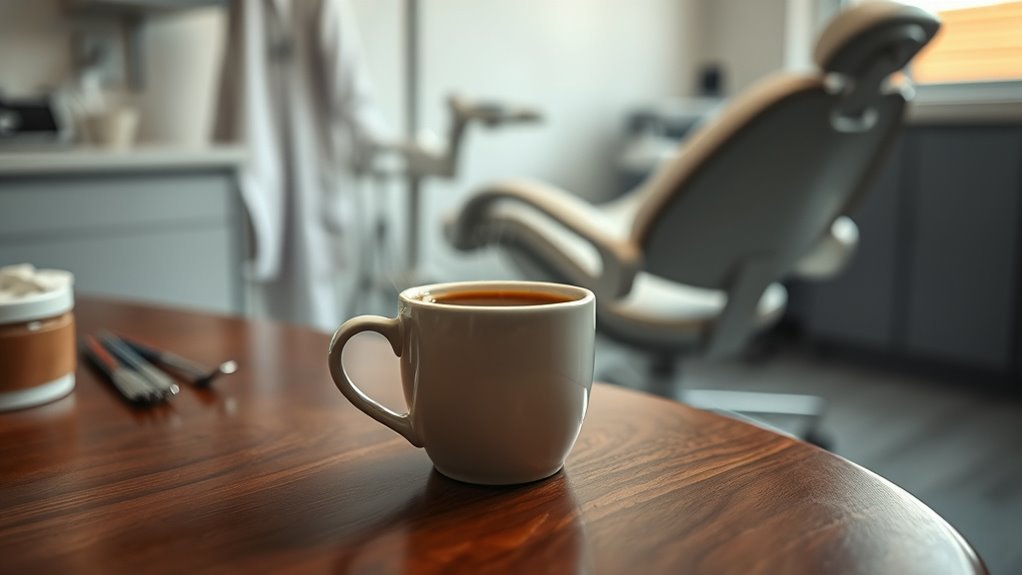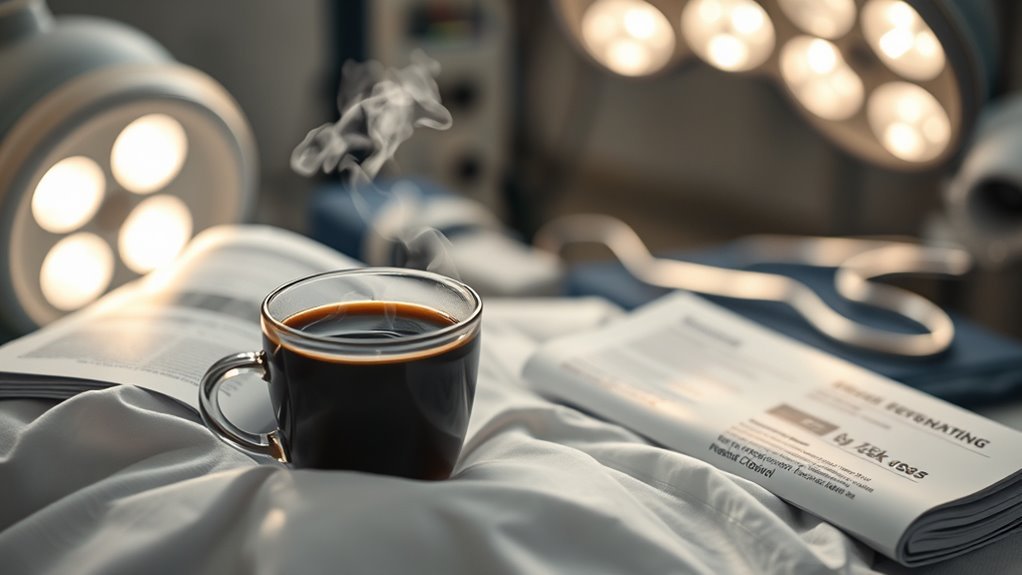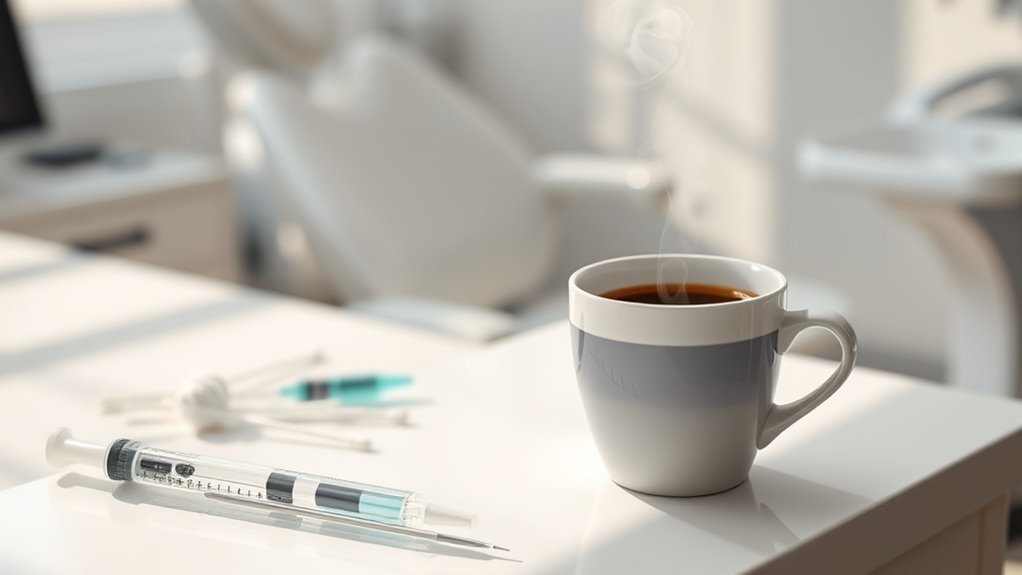Can I Drink Coffee Before Local Anesthesia
It’s best to limit your caffeine intake before receiving local anesthesia. Coffee can increase anxiety and affect your body’s response to anesthetics. Consuming it too close to your procedure might complicate the effectiveness of the anesthesia. Healthcare professionals recommend avoiding coffee for four to six hours beforehand. Staying hydrated and considering caffeine-free alternatives can help maintain your comfort. For more detailed recommendations and options, consider learning about what you can do before your appointment.
Understanding Local Anesthesia

When you’re about to undergo a procedure that requires local anesthesia, it’s important to understand what it entails. Local anesthesia is designed to block sensation in a specific area of your body during various anesthesia procedures, ensuring you remain comfortable while awake. There are several local anesthesia types, including topical anesthetics, injections, and nerve blocks, each chosen based on the procedure’s requirements. Topical anesthetics numb the skin’s surface, while injections provide deeper pain relief. Nerve blocks target specific nerves to eliminate sensation in a larger area. Knowing these options empowers you to discuss your preferences with your healthcare provider, leading to a more comfortable experience. Understanding local anesthesia enables you to approach your procedure with confidence and clarity.
The Role of Caffeine in the Body
Caffeine affects your body by stimulating the central nervous system, which can increase alertness and reduce fatigue. However, it may also interact with local anesthesia, potentially impacting its effectiveness. Understanding the timing and dosage of caffeine intake is essential when preparing for procedures involving anesthesia.
Caffeine’s Effects on Body
Although many people enjoy coffee for its stimulating effects, understanding caffeine’s role in the body is essential, especially before undergoing procedures like local anesthesia. Caffeine primarily affects your central nervous system, enhancing alertness and reducing fatigue. It’s metabolized by the liver, and individual variations in caffeine metabolism can influence how it affects you. If you’re a regular coffee drinker, you might experience caffeine withdrawal symptoms like headaches or irritability if you suddenly stop. This can impact your comfort during medical procedures. Additionally, knowing your body’s response to caffeine can help you make informed decisions about consumption before anesthesia. Ultimately, being aware of these effects empowers you to manage your health more effectively.
Interaction With Anesthesia
How does caffeine interact with local anesthesia? Caffeine metabolism can influence how your body responds to anesthesia. According to anesthesia guidelines, caffeine may increase your heart rate and blood pressure, potentially complicating anesthesia administration. While it doesn’t directly negate the effects of local anesthesia, high caffeine levels can lead to heightened anxiety or restlessness, which may affect your overall experience during the procedure. Additionally, if you consume caffeine regularly, your body may metabolize anesthetic agents differently, possibly impacting their efficacy. It’s important to communicate any caffeine consumption with your healthcare provider to guarantee a safe and effective anesthesia plan. Prioritizing this conversation empowers you to make informed decisions about your care.
Timing and Dosage Considerations
When considering the timing and dosage of caffeine before a procedure involving local anesthesia, it is vital to understand how caffeine affects your body. Caffeine from coffee can alter your metabolism, potentially impacting anesthesia effectiveness. When consumed, caffeine is absorbed quickly, reaching peak levels in your bloodstream within 30 to 60 minutes. If you drink coffee too close to your procedure, it might interfere with the anesthesia’s action, leading to reduced effectiveness. Ideally, you should limit caffeine intake several hours before your appointment. Additionally, consider your usual coffee consumption; regular drinkers may process caffeine differently than occasional users. Balancing timing and dosage is fundamental for ensuring the best anesthesia outcomes while allowing you the freedom to enjoy your coffee.
How Caffeine Affects Anesthesia
Caffeine can markedly influence the effects of anesthesia, as it interacts with various physiological processes in the body. If you’re sensitive to caffeine, it may heighten your anxiety or alter your pain perception during a procedure. This sensitivity can lead to a decreased anesthesia effectiveness, meaning you might not respond as well to the local anesthetic. Additionally, caffeine can impact your body’s metabolism, potentially affecting how quickly the anesthetic takes effect. It’s crucial to take into account these factors, especially if you consume caffeine regularly. Balancing your caffeine intake before a procedure could help guarantee ideal anesthesia outcomes. Ultimately, being mindful of your caffeine consumption can contribute to a smoother experience during your local anesthesia.
Recommendations From Healthcare Professionals

When considering coffee before local anesthesia, healthcare professionals often emphasize the interaction between caffeine and anesthetic agents. It’s important to think about when you consume coffee, as timing can affect your procedure. Additionally, individual health factors should always be taken into account to guarantee a safe experience.
Caffeine and Anesthesia Interaction
Although many people enjoy their morning coffee, it’s essential to reflect on how caffeine might interact with local anesthesia. Caffeine can affect your body’s metabolism, potentially altering the effectiveness of anesthesia protocols. When you consume caffeine, it can speed up the metabolism of certain medications, including anesthetics, which may lead to reduced efficacy. This interaction might cause your healthcare provider to adjust dosages during your procedure. If you’re a regular coffee drinker, it’s wise to discuss your caffeine intake with your provider beforehand. They can offer tailored advice based on your specific situation and the type of anesthesia being used. Ultimately, clear communication guarantees that you receive the safest and most effective care possible.
Timing of Coffee Consumption
Understanding how caffeine affects anesthesia leads to another important consideration: the timing of coffee consumption. Healthcare professionals generally recommend avoiding coffee in the hours leading up to your appointment for local anesthesia. This is because caffeine can potentially alter your response to anesthesia, leading to complications or increased anxiety. Ideally, it’s best to stop coffee consumption at least four to six hours prior to your procedure. This timeframe allows your body to metabolize the caffeine, minimizing any risks associated with its presence during anesthesia. If you’re unsure, always consult your healthcare provider for personalized advice. Being mindful of when you consume coffee can help guarantee a smoother experience during your local anesthesia procedure.
Individual Health Considerations
Before your procedure, it is essential to reflect on your individual health circumstances, as they can greatly impact your experience with local anesthesia. If you have a known caffeine sensitivity, it’s wise to contemplate how coffee might affect you. Caffeine can increase anxiety or jitteriness, which could complicate your response to anesthesia. Additionally, certain health conditions, like heart issues or high blood pressure, may be exacerbated by caffeine consumption. Always communicate your health history to your healthcare provider to guarantee they can tailor their recommendations to your needs. Ultimately, prioritizing your individual health will help secure a smoother experience with local anesthesia, allowing you to feel more at ease during the procedure.
Potential Risks of Drinking Coffee Before Surgery

Drinking coffee prior to surgery can pose several risks that you should consider. Caffeine can lead to increased heart rate and elevated blood pressure, which may complicate surgery preparation. Additionally, if you’re used to consuming caffeine regularly, skipping your morning coffee might trigger caffeine withdrawal symptoms like headaches, fatigue, or irritability, impacting your overall well-being during the procedure. These symptoms could also distract you or hinder your ability to communicate effectively with the medical team. It’s essential to weigh these potential issues against your desire for that caffeine boost. Always consult your healthcare provider about your coffee consumption and how it might affect your surgery experience. Being informed helps you make the best decisions for your health and comfort.
Alternatives to Coffee Before Your Appointment
If you’re considering alternatives to coffee before your appointment, there are several options that can help you stay alert without the potential risks associated with caffeine. Herbal teas, such as peppermint or ginger, can provide a revitalizing boost and help with relaxation. They’re caffeine-free, so you won’t have to worry about any adverse interactions with anesthesia. Additionally, decaffeinated options like decaf coffee or tea can satisfy your craving for the familiar taste without the jitters. You might also explore energy-boosting snacks, like fruits or nuts, which can enhance your energy levels naturally. Each of these alternatives allows you to maintain focus while ensuring your safety and comfort during your procedure. Choose what feels best for you!
Personal Considerations and Pre-Procedure Guidelines

While it’s essential to take into account your individual health needs, following specific pre-procedure guidelines can help guarantee a smoother experience. First, make sure you’re well-hydrated before your appointment—pre-procedure hydration is vital for your comfort and can aid in the anesthesia process. Drink water, but avoid caffeine, as it might lead to increased anxiety or jitters. Consider your personal comfort; if you’re feeling anxious, practicing relaxation techniques can be beneficial. Be mindful of any medications you take and discuss them with your healthcare provider. Finally, don’t hesitate to ask questions or express any concerns you may have. This proactive approach will help you feel empowered and relaxed as you prepare for your procedure.
Frequently Asked Questions
Can I Drink Decaffeinated Coffee Before Local Anesthesia?
You might wonder if you can have decaffeinated coffee before local anesthesia. Generally, it’s best to follow anesthesia guidelines, which often recommend avoiding any food or drink prior to your procedure. However, decaf coffee can offer some benefits, like hydration without the jitters. Just make sure to consult your healthcare provider for personalized advice, as they know your specific situation best and can guide you on what’s safe to consume.
How Long Should I Wait After Drinking Coffee Before My Procedure?
So, you’re wondering how long to wait after that delightful cup of coffee before your procedure? Well, it turns out your body’s coffee metabolism can take a bit of time. Generally, waiting at least an hour or two is advisable to guarantee anesthesia safety. You wouldn’t want your caffeine buzz competing with your doctor’s magic, right? So sip slowly and let that java work its way out before heading off to the procedure!
Will Coffee Affect My Recovery After Local Anesthesia?
Coffee can affect your recovery after local anesthesia, primarily due to its caffeine content. While it might help with pain management by making you feel more alert, it can also increase anxiety, which isn’t ideal during recovery. If you’re sensitive to caffeine, it may heighten your discomfort or restlessness. It’s best to consult your healthcare provider about your coffee habits to guarantee a smooth recovery and minimize any potential side effects.
Can I Consume Other Caffeinated Beverages Before Anesthesia?
Imagine the rush of energy as you sip a fizzy drink, caffeine coursing through your veins. Before anesthesia, it’s best to be cautious with caffeine consumption. While one or two caffeinated beverages might not cause issues, excessive intake can heighten anxiety and potentially affect anesthesia effects. To guarantee a smooth experience, it’s wise to limit caffeine and focus on hydration instead. You want your procedure to be as comfortable and effective as possible.
What if I Regularly Drink Coffee and Can’t Abstain?
If you regularly drink coffee and can’t abstain, you might face caffeine withdrawal symptoms, like headaches and irritability. While these symptoms won’t directly affect the anesthesia’s effectiveness, they can make your experience uncomfortable. It’s important to discuss your caffeine habits with your healthcare provider, who can guide you in managing withdrawal and ensuring a smoother procedure. Balancing your caffeine intake while prioritizing safety is key, so don’t hesitate to seek advice.






